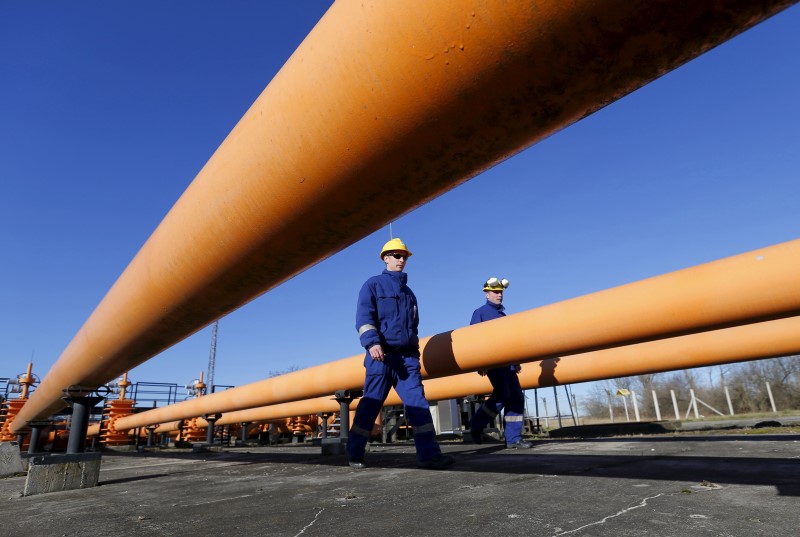Investing.com - Here’s a look at three things that were under the radar this past week.
1. ‘No Free Lunch’ Has Different Meaning For Some U.S. Gas Drillers
There’s no such thing as a free lunch. That’s the maxim the world pretty much operates by.
Yet, the experiences of natural gas drillers at Texas’ Waha hub may make that sound like a cruel joke.
Next-day natural gas prices at Waha plunged to record negative levels this week. And some drillers were not only getting no money for the commodity, but also paying those with spare pipeline capacity to take the unwanted gas.
That’s akin to giving away your bread and paying people to eat it. It’s not something OPEC is ever expected to do with its oil, even if that unlikely reaches zero value at some point.
Pipeline constraints in the Permian basin in West Texas were to blame for the phenomenon. The Permian is the nation’s largest oil field, but it also produces large volumes of gas and the region lacks pipelines to move it. That has squeezed gas prices there for some time.
Weak demand and recent equipment problems on a key pipeline in New Mexico have exacerbated the problem, Reuters reported.
Spot prices at the Waha hub fell to minus $3.38 per million British thermal units for Wednesday from minus 2 cents for Tuesday. That beat the prior all-time next-day low of minus $1.99 for March 29.
On the broader front, futures of gas on the New York Mercantile Exchange, which set month-ahead prices, have also been weak lately as the advent of spring weather tempers heating demand.
The United States experienced one of its heaviest gas consumption periods ever in the winter as heating demand spiked from record low temperatures caused by a polar vortex. Gas futures reached more than 4-1/2-year highs of nearly $5 at the height of the cold weather in November. They are now well below $3.
2. As Oil Prices Flirt With Highs, Energy Stocks Slide
When oil prices rack up gains, energy stocks tend to join in on the fun. But energy stocks lagged the swashbuckling moves higher in oil prices this week, leaving many scrambling for answers.
Oil prices rose nearly 5%, outpacing gains in the S&P 500 energy sector, which served up an increase of about 2.25%.
Some in the investment community outlined three factors for the disconnect between energy stocks and oil prices: valuation, valuation, valuation.
Energy stocks have gone up too fast too soon. This prompted investors to remain on the sidelines or head for the exits. The energy sector trades at 18x 2019 earnings, above 16.3x for the S&P 500.
There appears little hope, however, that energy companies will be able to jack up earnings and justify their valuations as the bulk of companies in the sector have seen double-digit declines in first-quarter earnings expectations.
Among the 11 sectors, the energy sector has recorded the largest decrease in expected earnings growth since the start of first quarter to -18.4%, FactSet said last week. Despite the decline in expected earnings, the energy sector "has witnessed the third-largest increase in price of all eleven sectors since December 31 at 15.6%," the report said.
The lower expectations on earnings growth has been driven by lower average oil prices in the first quarter of the year compared with a the same period a year ago.
"Despite an increase in price during the quarter, the average price of oil in Q1 2019 ($54.81) to date is 13% lower than the average price of oil in Q1 2018 ($62.89)," FactSet said.
3. Travel Spending Expectations Fall
The Dow Jones Transportation index is down slightly year to date, slightly below the Dow Industrials. But those long transports may have pause, given Morgan Stanley’s note this week.
The investment bank said in note on airline stocks that companies are lowering their budgets for corporate travel this year after surveying managers again “to obtain an update given U.S. Government shutdown effects, uncertainty regarding Brexit and slowing global macro trends.”
On a budget-weighted basis, corporate travel expenditure is expected to grow 2% in 2019, down from 3.7% growth expectations from a survey in November.
Of airline respondents surveyed, 59% expect an increase in budget spending, which is down from 66% in November.
“In this update we focus primarily on volume-based changes in travel spend, with airline managers now expecting net booking volume increase of (about) 1.5% in 2019,” Morgan Stanley said. “Compared to our November survey where 75% of respondents expected an increase in airline bookings for 2019, now only 45% of respondents expect an increase.”
